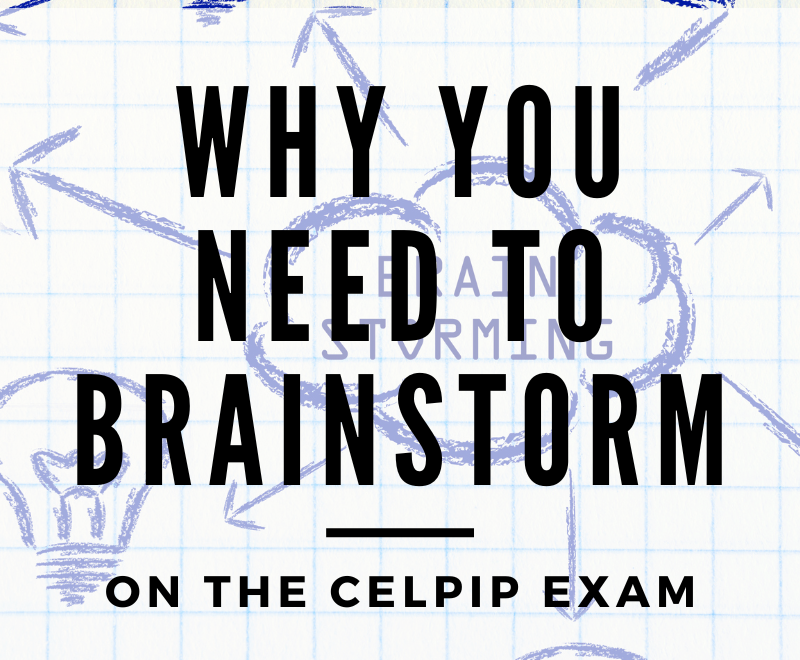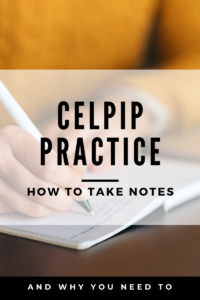If you struggle with the writing section of the CELPIP exam, then this is the post for you!
Brainstorming.

I think I know what you’re thinking…
“Brainstorming? That’s a waste of time. I need to focus on getting my answer down before my time runs out! I don’t have time to waste on brainstorming!”
Sound familiar?
Did you know that brainstorming is one of the most important things you can do to improve the quality of your writing and the number of ideas you are able to include in your work?
According to Dr. Randi Reppen of Cambridge.org,
Brainstorming provides time to generate ideas related to the writing task. It allows us to jot down ideas and vocabulary related to the topic. In cognitive terms, it activates our prior knowledge.
Dr. Randi Reppen
Reppen also refers to brainstorming as, “pre-writing, or a getting ready to write activity.”
A “getting ready to write activity.” That’s interesting! And did you notice that first quote? “Brainstorming helps bring to mind what you know or what you have experienced about a certain topic.”
If your previous knowledge or experience with a topic has been activated, it will be much easier for you to use them in your writing!
Unfortunately, brainstorming is one of those frequently skipped strategies – right up next to notetaking.
Why People Skip Brainstorming
Test takers feel like they simply don’t have time to brainstorm because the clock is literally ticking against them. Why waste precious minutes trying to brainstorm about what to write?
Instead, many will simply read the writing question and dive right into answering it as best they can.
Maybe you do this as well!
Benefits Of Brainstorming
- More ideas! Brainstorming will help you create more ideas to work with before you actually start writing! You will be able to identify important topic sentences to start your paragraphs with, and you’ll also be able to identify supporting ideas as well which will strengthen your idea.
- Word Count Success You need to write at least 150 words, but no more than 200 in both writing tasks of the CELPIP. If you just started writing without taking some time to brainstorm, and we’re only talking about 2-3 minutes max to do this, then you will likely find yourself struggling to come up with what to write which will make it more difficult for you to achieve your wordcount goals.
- Get Organized One of the common mistakes I see students make in the writing section is that their ideas often don’t follow a logical order. While they make great points, they frequently are all over the place: they’re scattered! Brainstorming can help you identify important points that you’d like to cover. (It will also help you to eliminate ideas that you don’t want to write about!) And when you know what main points you want to use, you can plan out when it would make most sense to discuss them in your writing.
- Relax! You know what you’re doing! Did you know you’ll likely feel nervous when you’re doing the CELPIP exam? (This is normal. It means you’re human!) I freak out when I know I need to get a needle. (I hate needles.) But when the nurse giving me the needle explains what is about to happen, it seems to make things a little easier to deal with. The savvy nurses keep talking with me as they do their work, and before I know it, they’re done. I was so busy talking with them that I barely noticed the ‘poke.’ Brainstorming can do that for you. Think about it! If you take a few minutes to come up with ideas about what you’d like to talk about, you won’t have to face that terrifying feeling of running out of things to say. All you’ll need to do is refer to your notes as you write. (Brainstorming can almost be like a map – it will help you get where you need to go!)
So, do yourself a favor. Take 2 or 3 minutes BEFORE you start to write and brainstorm. Going a little slower at the beginning by taking time to brainstorm will actually help you go faster later.
What To Focus On
The CELPIP isn’t measuring your creative powers. According to CELPIP.ca,
They are often under the impression that their responses need to be original and creative, and they feel that they don’t have a good enough imagination to come up with ideas. In fact, creativity is not a factor included in the Writing or Speaking performance standards. While test takers are welcome to be creative in their CELPIP responses (provided that they stay on topic and keep the tone appropriate), raters don’t assess entertainment value. What they do evaluate—in the Content/Coherence dimension—is the depth, clarity, and flow of the ideas. A strong response has a clear purpose and presents identifiable main ideas supported with meaningful, precise details. Brainstorming practice can help learners maximize their ability to produce such content—not through imagination or invention, but by accessing their knowledge and experience.
Neil Gray
There are two things I want to pull out of that mighty quote that you need to remember:
You don’t need to be creative in the sense that you’re trying to come up with a story. This isn’t the kind of brainstorming you’ll need. Instead, brainstorming for the CELPIP means you’re pulling ideas from what you know and have experienced in your life and applying them in your answer.
Strong answers are organized and well supported. Brainstorming will help you figure out what important points you’ll cover as you write. It will also help you determine what supporting evidence you’ll provide.
Brainstorming matters. You should be taking the first 2 or 3 minutes of each writing task to do it. You’ll be glad you did!



Leave a Reply